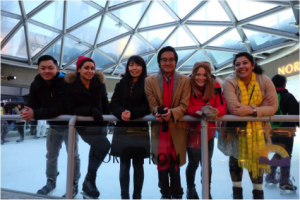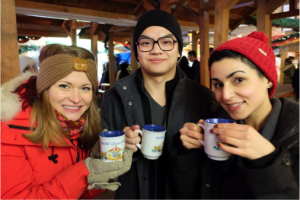Let’s be honest, if you’re in the MM program, it’s likely because you want to add one final piece of the puzzle to get a job. I was no different. I had a Bachelor of Arts from UBC, and had taught English for a couple years in Spain and wanted to do something in business, whatever that meant.
My job search was varied and I applied to a range of jobs that had little in common. The first piece of advice I’d give is apply to anything you think you could do. The worst case scenario is that you get another live opportunity to test your interview skills. The day you sit down for the job you really want, you’ll be amazed how much more comfortable you’ll feel if you’ve already sat in the hot seat a number of times before.
The second piece of advice is really understanding the job you’re applying for and what you bring that makes you a great candidate. I applied for HSBC’s International Management programme. I was fortunate, I had a broad first degree which gave me a firm base in world politics, experience moving and living abroad in another language and the MM program gave me the finance angle that I was lacking previously. It seems so simple, but it’s your job to really make sure the interviewer understands the relevance.
Finally, I’ll echo something I know other MMs have written about, your classmates. Network is important, and to be clear not networking, but your network. Networking is often shallow and meeting people is great but I highly recommend you foster a network of people you really know and trust, and then invest time to keep up with them. I invested a lot of time in the MM program when I was going through it and would recommend you do the same, at a bare minimum get to know your classmates over the course of the program to make sure you can all help each other. You’ve got a built in opportunity to meet likeminded people over a relatively long period of time, use it!
In the end, I looked for something international, and wasn’t too focused on the industry. It meant I went for a number of interviews, often unrelated. I noticed in the interviews the question I always asked the interviewer was what international opportunities existed in the company. When I interviewed with HSBC it just clicked, I could identify what made me a good fit for them, and the rest is history. I’ve now had the great fortune to have worked for the bank in Paris, London and now Bangkok. Your ambition may not be international work, but whatever your driver, it’ll come out through the process. Let it happen, and good luck!
– John Holt, MM ’10
 Follow
Follow We’ve got a myriad of ever-changing & exciting activities, particularly under the glitz and glimmer of the holiday season. Downtown becomes a shimmering spectacle, with its central Robson Square transformed into a skating rink. So for Lady Canadiana, we strapped up our laces and embraced this new experience for many! After 3 months of mutual support through multiple learning curves, we knew we had each other’s backs (and bottoms) on this slippery ride.
We’ve got a myriad of ever-changing & exciting activities, particularly under the glitz and glimmer of the holiday season. Downtown becomes a shimmering spectacle, with its central Robson Square transformed into a skating rink. So for Lady Canadiana, we strapped up our laces and embraced this new experience for many! After 3 months of mutual support through multiple learning curves, we knew we had each other’s backs (and bottoms) on this slippery ride. Our skating success earned us some much-needed refuel, and the opportunity to visit another local hotspot: the Vancouver Christmas Market. This annual favorite is quintessential of the traditional German style, with every kind of yuletide grub available. A perfectly apt representation of our various cultural offerings, and one of my personal favorites. Not surprisingly, we finished the evening with bellyfuls of free samples, from kettle corn to sauerkraut, coco to vino.
Our skating success earned us some much-needed refuel, and the opportunity to visit another local hotspot: the Vancouver Christmas Market. This annual favorite is quintessential of the traditional German style, with every kind of yuletide grub available. A perfectly apt representation of our various cultural offerings, and one of my personal favorites. Not surprisingly, we finished the evening with bellyfuls of free samples, from kettle corn to sauerkraut, coco to vino.